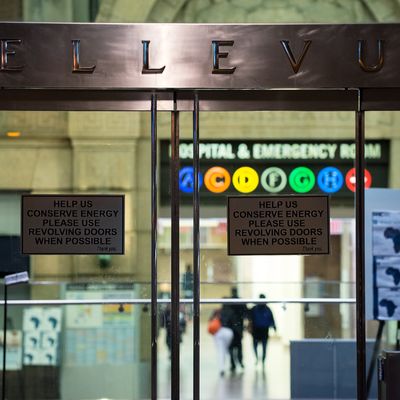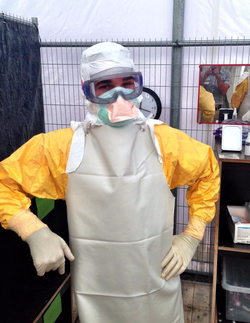
On Thursday, Dr. Craig Spencer, who had been working with Doctors Without Borders treating Ebola patients in Guinea, was rushed to New York’s Bellevue Hospital with a high fever. A few hours later, tests confirmed the worst: Spencer has Ebola, making him the fourth person diagnosed with the disease in the United States, and the first diagnosed outside of Texas. So far, the situation appears to be under control: Bellevue has been preparing for weeks, Spencer was hospitalized shortly after becoming symptomatic, and officials are already tracking down anyone he may have come into contact with. However, the fact that he went to a bowling alley, took a taxi, and rode the subway on Wednesday night is not likely to calm those already on edge about the virus. Here’s what we know about the situation so far.
Who is Dr. Spencer?
According to his LinkedIn profile, he has worked as a doctor at New York-Presbyterian/Columbia University Medical Center since July 2011. He went to John Hopkins University for his undergraduate degree, attended medical school at Wayne State University in Detroit, and earned a master’s degree in public health at Columbia University. He is from Michigan and now lives in Harlem, on West 147th Street.
Friend Patrick Crossman said Spencer is a banjo player and marathon runner and frequently travels abroad on medical missions. “He’s been overseas I don’t know how many times,” Crossman told Bloomberg News. “Every time I talk to him he’s on another mission in another country. I believe he was training doctors in India, and he’s been to Africa multiple times.”
Crossman described Spencer as “really bubbly and outgoing, just a really fun and funny guy.” “It doesn’t surprise me that he would be one of the first people to step up,” he said of Spencer’s work with Ebola patients. “He would tackle whatever comes his way.”

What did he do in Africa?
Physicians who volunteer with Doctors Without Borders can only be in the field for four to six weeks. Spencer posted a photo of himself on Facebook wearing protective gear and wrote, “Off to Guinea with Doctors Without Borders (MSF). Please support organizations that are sending support or personnel to West Africa, and help combat one of the worst public health and humanitarian disasters in recent history.”
Doctors in the program follow strict protocols. Since Spencer was working with Ebola patients, he would have been told to monitor his health for 21 days. Spencer left Guinea on October 14, arrived at JFK Airport three days later, and has yet to return to work.
New York-Presbyterian/Columbia University Medical Center said in a statement that Spencer “went to an area of medical crisis to help a desperately underserved population. He is a committed and responsible physician who always put his patients first.”
When did Spencer develop symptoms?
According to the New York Times, Spencer told officials that he was not aware of his protective gear being breached, but he had still been monitoring his health, as instructed. He said he was feeling sluggish on Tuesday but didn’t develop a fever until Thursday morning at 11 a.m. With a temperature of 100.3 degrees (Update: Because of a transcription error, Spencer’s fever was originally reported to be 103 degrees, which is much worse), he contacted the staff of Doctors Without Borders. “The individual engaged in regular health monitoring and reported this development immediately,” the group said in a statement.
How did the city respond?
Doctors Without Borders contacted the city’s health department, which called the Fire Department. Emergency medical workers arrived at Spencer’s apartment in full protective gear, and he arrived at Bellevue just after 1 p.m. The vehicle he rode in was immediately decontaminated.
On Thursday night, a sample taken from Spencer had tested positive for Ebola. A second sample is being flown to CDC headquarters in Atlanta for more testing.
How is Spencer being treated?
While any hospital is supposed to be prepared to treat patients in the early stages of the disease, Bellevue is one of eight facilities in New York State that Governor Cuomo designated to care for Ebola patients long-term. Doctors there have received hours of training on putting on and removing personal protective equipment, and have been running drills using “test patients.” They have also treated several suspected Ebola patients who then tested negative for the virus.
Spencer is in one of Bellevue’s four isolation rooms in the infectious-disease ward, which is located on the upper floor of the building. According to the Times, “a health care worker at the hospital said that Dr. Spencer seemed very sick, and it was unclear to the medical staff why he had not gone to the hospital earlier, since his was high.” There have been no updates on his condition, and whether he may receive one of the experimental treatments that have saved other American Ebola patients is unclear.
Who had contact with Spencer?
Officials say that so far they’re only aware of four people Spencer may have come into contact with: his fiancée, two friends, and an Uber driver. According to NBC New York, the fiancée and friends have been quarantined and are showing no symptoms of Ebola. The Uber driver was located and determined not to be at risk because he had no direct physical contact with the doctor.
Are New Yorkers at risk?
At a press conference on Thursday night, city and state officials urged New Yorkers not to panic, stressing again that the disease is not contagious until after the patient develops symptoms. “Ebola is an extremely hard disease to contract,” Mayor Bill de Blasio said. “New Yorkers who have not been exposed to an affected person’s bodily fluids are not at all at risk.”
Of course, plenty of people are still alarmed, especially because Spencer traveled all over the city in the past few days. New York City Health Commissioner Dr. Mary Travis Bassett said the physician took a three-mile jog; rode the A, 1, and L trains; took a cab to the Gutter bowling alley in Brooklyn; and visited the High Line.
While Spencer was not feeling ill during any of these activities, precautions are still being taken. His Harlem apartment has been roped off, and the Department of Health is on the street, handing out information to people in the neighborhood. The Gutter has been closed and will be examined on Friday. Officials are tracking Spencer’s movements using his MetroCard, though they said it’s “extremely unlikely, the probability being close to nil” that any of his fellow riders were exposed.
“Ebola right now can spread fear just by the sound of the word,” Governor Cuomo said at the news conference. “I know it’s a frightening situation. … But the more facts you know the less frightening the situation is.”
This post has been updated throughout.






























